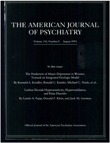A psychobiological perspective on the personality disorders
Abstract
A preliminary but growing body of evidence supports the existence of genetic and biological substrates of personality, suggesting the utility of a psychobiological perspective on the personality disorders. The investigation of biological correlates of personality disorders can provide an empirical base to explore the relationship between biological predispositions and psychological function. The authors propose a psychobiological model based on dimensions of cognitive/perceptual organization, impulsivity/aggression, affective instability, and anxiety/inhibition. These dimensions span the DSM-III- R axis I and axis II disorders. The authors review phenomenological, genetic, and biological evidence in relation to each of these dimensions. Although such an approach remains heuristic, this model provides a promising vantage point from which to generate investigation of the development and treatment of the personality disorders.
Access content
To read the fulltext, please use one of the options below to sign in or purchase access.- Personal login
- Institutional Login
- Sign in via OpenAthens
- Register for access
-
Please login/register if you wish to pair your device and check access availability.
Not a subscriber?
PsychiatryOnline subscription options offer access to the DSM-5 library, books, journals, CME, and patient resources. This all-in-one virtual library provides psychiatrists and mental health professionals with key resources for diagnosis, treatment, research, and professional development.
Need more help? PsychiatryOnline Customer Service may be reached by emailing [email protected] or by calling 800-368-5777 (in the U.S.) or 703-907-7322 (outside the U.S.).



